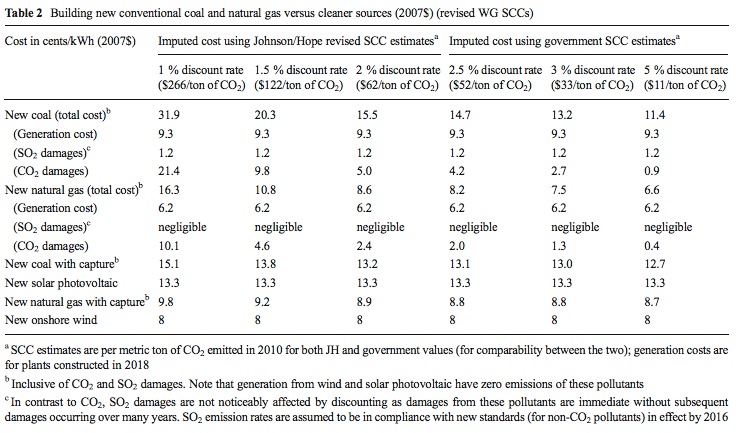ASSOCIATION FOR ENVIRONMENTAL STUDIES AND SCIENCES
This paper extends the work of Johnson and Hope (2012), who re-estimated the US government’s estimates of climate change damages, called the “social cost of carbon” (SCC), to more fully account for impacts on future generations. To demonstrate the policy implications of their SCC estimates, Johnson and Hope (JH) incorporated the costs of pollution into the cost of electricity generation from coal, natural gas, onshore wind, and solar photovoltaic.
They found that at all of their SCCs, building new generation from the cleaner sources they examined was less expensive (inclusive of pollution costs) than from coal. Comparing the cleanest technologies to natural gas, wind and solar were more efficient at some of JH’s estimates. In contrast, at all of the government SCC values, natural gas was always more efficient than any of the other technologies.
Here, we extend JH’s analysis in three ways. First, we add two options to their set of cleaner technologies, coal and natural gas using carbon capture and storage technology (CCS). Second, we assess the cost of continuing to operate a typical coal plant in the existing fleet versus replacing it with cleaner generation. Third, we update their analysis using the most recent government estimates of the SCC and generation costs. Specifically, we use SCC government estimates published in July 2013, which are significantly higher than the original values used in JH.1 We also use the most recent projections from the Energy Information Administration (EIA) for electricity generation costs, which show significantly lower estimates for wind and solar photovoltaic compared to 2012 values.
Overall, for new generation, we find that all JH and government SCCs justified conventional natural gas, natural gas with CCS, and wind over conventional coal. Most estimates also justified solar and coal with CCS over conventional coal, and wind over natural gas. For existing generation, at all of JH’s SCCs, continuing to operate some of the dirtiest coal plants is more expensive than replacing them with natural gas, natural gas with CCS, or wind; at their two highest estimates, this is also true for new coal with CCS and solar photovoltaic. For the government’s SCCs, we found that its central and upper end values justify replacing a dirty coal plant with new natural gas, natural gas with CCS, or wind. At the government’s lowest SCC value, the cost of new natural gas generation is equal to the cost of existing coal.
Download full report (PDF): The Social Cost of Carbon
About the Association for Environmental Studies and Sciences
www.aess.info
“The Association for Environmental Studies and Sciences (AESS) is an independent faculty-and-student-based professional association in higher education, designed to serve the needs of environmental scholars and scientists who value interdisciplinary approaches to research, teaching, and problem-solving. Founded in 2008, the Association seeks to provide its members with the latest environmental information and tools to create better courses, strengthen research, develop more satisfying careers, harness the power of a collective voice for the profession, and enjoy each other’s company at national and regional meetings.”
Tags: AESS, Association for Environmental Studies and Sciences, Coal







 RSS Feed
RSS Feed